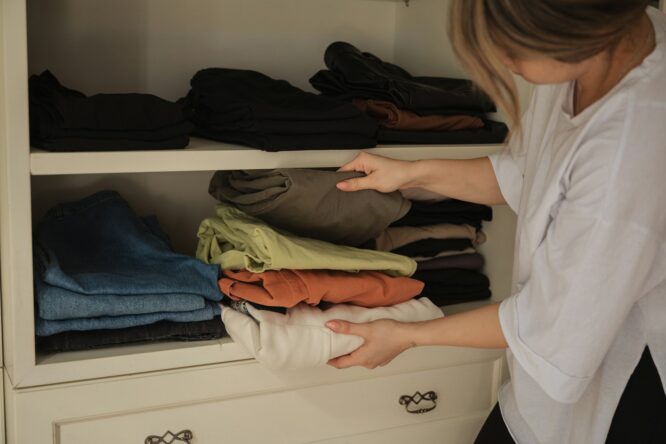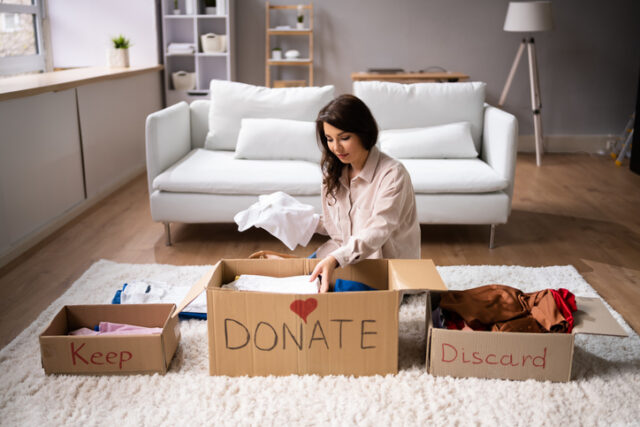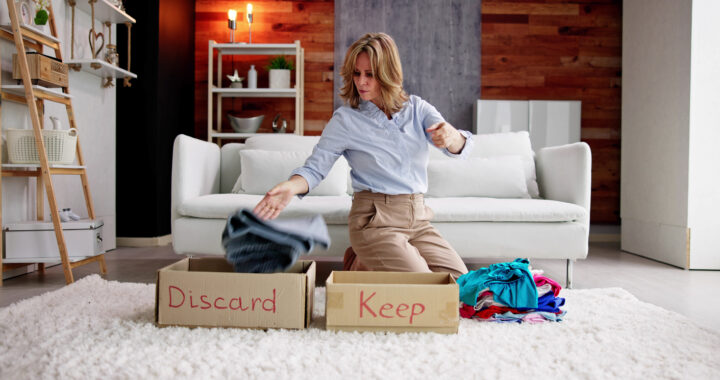Decluttering gets overwhelming fast, especially when you’re emotionally attached to your stuff.

However, if you don’t want to live in a total pigsty, you know that you’ll have to learn to let go of stuff you never use and really don’t need. Doing it is easier said than done, but following a few go-to rules can take the stress out of sorting. These make the process way simpler. Your home will be much better for it, as will your mental health.
1. If it wouldn’t matter if you forgot you had it, let it go.

If you’ve ever rediscovered something in the back of a drawer and thought, “Oh yeah, I forgot I owned this,” that’s a pretty good sign it’s not essential. If it didn’t cross your mind until now, chances are you didn’t need it in your life to begin with. That doesn’t mean it’s worthless, but it does mean it might be clutter.
This rule is great for breaking emotional attachments to things you’ve outgrown. If something hasn’t been useful or even noticeable in your daily life, there’s no guilt in letting it go. Your space should support the life you’re living now—not just store the past.
2. If you’d never buy it again today, toss it.

One of the easiest ways to decide what stays or goes is to ask: would you actually spend money on this now? If not, it’s probably not something that reflects your taste or needs anymore. It’s okay to outgrow things, even if they once felt like a great fit.
This is especially helpful for stuff like clothes, gadgets, or home decor. Just because you liked it once doesn’t mean you have to keep it forever. Tastes change, and so should your space. Don’t feel bad for changing your mind about something that used to serve you.
3. If it doesn’t have a home, it might not belong in yours.

When something always ends up in a pile, on the floor, or shoved wherever it fits, that’s a sign your home doesn’t have space for it, or maybe you don’t really need it. Having a clear place for everything makes your space calmer and easier to manage.
Instead of constantly rearranging or hiding things, notice which items just never seem to settle. If it’s always in the way or causing low-level stress, it’s worth asking whether you actually want or use it. You deserve a home that feels put together, not one that’s constantly battling overflow.
4. If it’s broken, and you haven’t fixed it, it’s time to say goodbye.

We all have that drawer of things we’ll “get around to fixing” one day—but often, those things just sit there. If it’s been months (or years) and it’s still broken, that “maybe later” becomes a mental weight more than anything else.
Sometimes keeping broken stuff feels like saving money or being responsible. But if you’ve lived this long without fixing it, it’s likely not a true priority. Letting it go can clear space physically and mentally, and you free yourself from the silent pressure of unfinished tasks.
5. If it makes you feel bad every time you see it, get it out.
 Source: Unsplash
Source: Unsplash Weirdly, some of the things we hold onto are the ones that bring guilt, sadness, or regret. Maybe it’s a gift you didn’t love, clothes that no longer fit, or reminders of a version of yourself you’ve moved past. These items don’t deserve prime real estate in your space.
Your home should feel like a safe place—not a storage unit for emotional baggage. Letting go of items that spark negativity isn’t shallow—it’s smart. You’re allowed to make space for things that reflect who you are now, not who you used to be or wish you were.
6. If you’re only keeping it because it was expensive, rethink that logic.

It’s hard to let go of something that cost a lot, even if you never use it. That price tag can feel like a trap, convincing you to keep something you don’t even like just because it once had value. However, the money’s already spent—the item isn’t going to refund you just by sitting there.
Holding on just to justify the purchase only extends the regret. Instead, think of it this way: the lesson was learned, and now it’s okay to move on. Selling, donating, or tossing it can feel freeing once you stop thinking of it as a sunk cost and start seeing it as clutter.
7. If someone else wanted you to keep it, ask yourself why.

We often hold onto things because we think we’re supposed to. Maybe it was your grandmother’s vase, or something your friend gave you that’s not really your style. But if you’re only keeping it to avoid disappointing someone, you’re prioritising their feelings over your peace.
You can be grateful for someone’s intentions without keeping the object forever. Memories and connections live in your heart, not in the stuff. Letting go of items that don’t serve you doesn’t mean letting go of love. It just means making room for what does.
8. If you’re keeping it “just in case,” give it a deadline.

The “just in case” trap is real, and it can fill your home fast. Whether it’s extra cables, clothes you might wear someday, or tools you might maybe use, these things tend to sit around forever. Giving them a clear expiration date makes the decision easier.
Try this: put the item in a box, label it with a date six months from now, and if you haven’t touched it by then, it goes. That way, you’re not being reckless—you’re giving yourself a fair chance to use it. But if it just sits there, you’ll know it’s time to let it go.
9. If it doesn’t fit your lifestyle anymore, let it move on.

Life changes. Maybe you used to entertain more, or you had a hobby that no longer lights you up. That’s normal, and it means some of your stuff might not fit your current rhythm. Hanging onto it can feel like clinging to an identity that’s no longer yours.
This rule helps you stay in sync with where you are now. Letting go of things that don’t align with your present doesn’t mean forgetting the past—it means making room for the future. Your space should reflect the life you’re living, not one you left behind.
10. If it doesn’t make your life easier, prettier, or more enjoyable, it’s optional.

At the end of the day, your belongings should serve you in some way. Whether it’s function, beauty, or joy—if something doesn’t offer one of those, it’s probably just taking up space. You don’t owe any item a permanent home just because you own it.
This is the “gut check” rule. Does this thing actually do anything for you? If not, it’s okay to let it go. Decluttering doesn’t have to be rigid or cold. It can be about building a home that feels lighter, more intentional, and more you.




